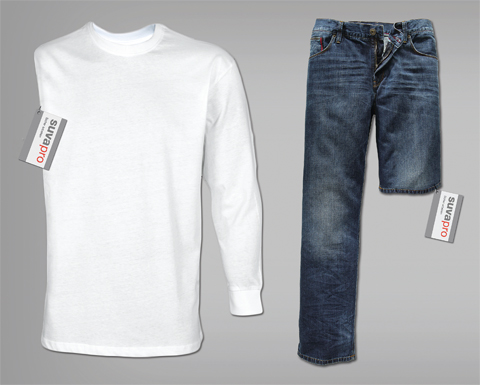"It would be ineffective on billboards".
Last year, around one hundred young talents took part in the ADC Young Creatives Award in teams of two in order to win a trophy and a place at the Young Lions Competition. The main sponsor and taskmaster was Suva. The competition was looking for communication ideas to protect apprentices from the risk of accidents at work. In a series, Werbewoche presents the four winning teams that will travel to Cannes this year.

Mathias Kröbl and Ricky Bruderer are the winners of the Alternative Media category. We talked to them about the ubiquity of advertising.

WW: What does the Alternative Media category mean exactly?
Ricky: It stands for what does not fit into the classic categories. An alternative media campaign is characterized by the fact that it takes place in unusual, surprising situations in the direct environment of the recipient. It wants to break out of what has been seen before.
Mathias: The medium otherwise strongly determines the advertising. With alternative media, it's different. An object is placed where it is not expected.
WW: You have designed clothes that have a handicap to be hung in H&M stores. What advantages do you see in such an alternative media action?
Ricky: When it comes to classic advertising, an inner censorship immediately arises in the recipient. With an alternative media campaign, young people are more receptive because the whole thing takes place in a familiar situation.
Mathias: Exactly. You spend your free time looking for a T-shirt at H&M, pull one off the shelf, and only then realize: Something is wrong. The message hits young people spontaneously and unexpectedly. There, where they feel comfortable and relax with friends.
Ricky: The idea also works only in this way. On a poster, the clothes do not work. If you discover the T-shirt while shopping, it's easier to empathize with the harsh reality of an accident at work. It is precisely this human ability that our action relies on.

WW: In your opinion, are there also places that should be free of advertising?
Mathias: That's a difficult one for me to answer. There's a difference between wanting to effect a purpose as an advertiser and being part of the target group. As an advertiser, you're more open to looking for solutions that might be too heavy for the target audience. You want to achieve a goal. As a consumer, on the other hand, you weight privacy much more heavily. As an advertiser, you have this target group in mind, but you go one step further.
Ricky: From a moral perspective, you can say you don't want to bother people with intrusive advertising messages or violate their privacy. But as an advertiser, it's primarily about being creative. Ideas have to generate more and more attention because they are competing with a growing amount of information. Basically, I think you have to give people fallback options. If they feel abused, you've gone too far.
WW: Then asked another way: What advertising annoys you yourselves?
Mathias: My profession also gives me a different perspective as a recipient. Unlike my girlfriend, for example, who is often annoyed by repeated TV commercials. Since I've been working in advertising, my focus is completely different: I analyze advertising.
Ricky: The commercials on TV also annoy me sometimes. And the ones on YouTube I find extremely intrusive. But it depends on the advertising. If it's good, I like to watch it. On the whole, advertising hardly bothers me. In Switzerland, there's mainly classic advertising, which you can easily decide to ignore.
WW: Why do you think your (non-classical) advertising picks people up positively?
Ricky: I think it is honest. It's not about selling something, but about raising awareness. Our idea is also designed as a guerrilla action that does not involve cooperation with H&M. This makes it come across as courageous. And ultimately, we want to leave our mark in this way. Safety in the workplace is a serious issue. A lot is justified to get this message across.
Interview: Simone Isliker








